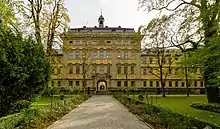Johann Joseph Dömling
Johann Joseph Dömling (13 January 1771 – 7 March 1803) was a German physician and professor of physiology at the University of Würzburg.[1]
Early life and education

Dömling, whose last name is also spelled Doemling, was born in Merkershausen. After being educated at the Juliusspitälisches Studentenkonvikt in the Juliusspital,[2] a boarding school for gifted but impoverished students, he studied at the University of Würzburg, supported by prince-bishop Franz Ludwig von Erthal. After Erthal's 1795 death, he planned a move to Hamburg with the goal of becoming a naval surgeon in England, but continued his studies when the new prince-bishop, Georg Karl Ignaz von Fechenbach zu Laudenbach, continued to support him financially.[3] Dömling received a doctorate of the philosophical faculty on 6 September 1793 and a doctorate in medicine on 23 June 1797.[4] His medical thesis was Dissertatio inauguralis sistens morborum gastricorum acutorum pathologiam and his advisor was Carl Caspar von Siebold.[5]
Academic career and death
He travelled on a study tour to Vienna and other cities in the Holy Roman Empire, meeting various famous physicians of his time. He succeeded Georg Christoph von Siebold (died 1798) as professor of physiology in Würzburg in 1799.[3] Dömling, who had originally supported a mechanistic physiology, became a proponent of romantic natural philosophy.[6] His textbook Lehrbuch der Physiologie des Menschen appeared in Göttingen in two volumes in 1802 and 1803.[7] Dömling was the first to suggest a normal endogenous presence of carbon monoxide in 1803.[8]
Dömling was also the Stadtarmenarzt, the pauper's doctor of the city of Würzburg.[6] He died at the age of 32 from an infection,[4] but it was rumoured that he had been murdered.[9]
Works
- Doemling, Johann Joseph (1797). Dissertatio Inauguralis Sistens Morborum Gastricorum Acutorum Pathologiam (in Latin).
- Doemling, Johann Joseph (1798). Ist die Leber Reinigungsorgan? Is the liver a purifying organ? (in German).
- Doemling, Johann Joseph (1800). Giebt es ursprüngliche Krankheiten der Säfte, welche sind es, und welche sind es nicht?. Are there original diseases of the juices, which are they and which are not? (in German)[10]
- Doemling, Johann Joseph (1802). Kritik der vorzüglichsten Vorstellungsarten über Organisation und Lebensprincip (in German). Bey Franz Xaver Rienner, privilegirten Buchhändler.
- Doemling, Johann Joseph (1802). Lehrbuch der Physiologie des Menschen: Generelle Physiologie. Specielle Physiologie. Phänomene der Sensibilität und Aeusserungen der Irritabilität (in German). Dieterich.
- Doemling, Johann Joseph (1803). Archiv für die Theorie der Heilkunde. Archive for the theory of medicine. (in German)
- Doemling, Johann Joseph (1803). Lehrbuch der Physiologie des Menschen: Specielle Physiologie. Wirkungen der Reproductionskraft (in German). Dieterich.
References
- August Hirsch (1877), "Doemling, Johann Josef", Allgemeine Deutsche Biographie (ADB) (in German), vol. 5, Leipzig: Duncker & Humblot, pp. 288–289
- Sticker, G. (1932). "Entwicklungsgeschichte der Medizinischen Fakultät an der Alma Mater Julia". In Buchner, Max (ed.). Aus der Vergangenheit der Universität Würzburg: Festschrift zum 350jährigen Bestehen der Universität (in German). Berlin: Springer. p. 486. ISBN 978-3-642-99578-1. OCLC 238793138.
- Sticker, p. 553
- "Würzburger Totenzettel". vb2.uni-wuerzburg.de. Retrieved 11 May 2021.
- Würzburger Hochschulschriften : 1581 - 1803 ; Bestandsverzeichnis. 1992.
- Gerabek, Werner E.; Haage, Bernhard D.; Keil, Gundolf; Wegner, Wolfgang (3 June 2011). Enzyklopädie Medizingeschichte (in German). Walter de Gruyter. ISBN 978-3-11-097694-6.
- Sticker, p. 553-554
- Hopper, Christopher P.; Zambrana, Paige N.; Goebel, Ulrich; Wollborn, Jakob (June 2021). "A brief history of carbon monoxide and its therapeutic origins". Nitric Oxide. 111–112: 45–63. doi:10.1016/j.niox.2021.04.001. PMID 33838343. S2CID 233205099.
- Gerabek, Werner E. (2003). "Der Würzburger Physiologieprofessor und Stadtarmenarzt Johann Joseph Dömling (1771-1803) - ein fast vergessener Pionier der romantischen Heilkunde". Würzburger Medizinhistorische Mitteilungen. 22: 21–29. ISSN 0177-5227. PMID 15637789.
- Doemling, Johann Joseph (1800). Giebt es ursprüngliche Krankheiten der Säfte: welche sind es, und welche sind es nicht? (in German). Göbhardt.
External links
- Doemling, J J at Kalliope-Verbund
- Johann Joseph Dömling at wuerzburgwiki.de